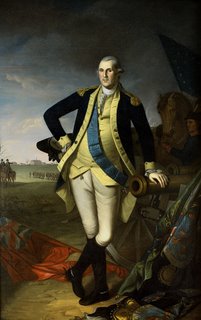George Washington's Letters
 This is an assignment adapted from an assignment posted by the Library of Congress. Painting at left: "George Washington at Princeton" by Charles Wilson Peale (www.senate.gov).
This is an assignment adapted from an assignment posted by the Library of Congress. Painting at left: "George Washington at Princeton" by Charles Wilson Peale (www.senate.gov).Group scribes: Please post the answers to your group's questions. It would be best to do this in paragraph form, but you could also cut and paste the questions below and then answer them.
Other class members: Please read through the group answers. Then compose a one-paragraph comment responding to the following prompt:
In his letters and in his Farewell Address, George Washington gave Americans advice about the future direction of our country. Pick one piece of advice and explain Washington's position. Then evaluate that advice. Was it good advice? Is it practical advice? Is it advice that we could follow today? Why or why not? Explain your answer with at least one reference to the issues and political situation of our country today.
Write complete sentences--no IM-speak.
Letter Questions
Set one:
How is the American nation guided by divine providence?
According to Washington, why is the United States unique among nations of the world?
How does government best serve the interests of the people?
What are the feelings of Southerners toward the national government? According to Washington, what factors are responsible for these attitudes?
What concerns does Washington express regarding future adherence to the excise tax on whiskey?
Set two:
According to Washington, should differences of opinion be put aside in the interest of unity?
How do political factors obstruct the functions of government?
Why does Washington feel that the nation will be torn asunder by political factions?
According to Washington, what role have gazettes (newspapers) played in promoting discord?
What is the tone of Washington's letter to Jefferson?
Set three:
Why does Washington believe it is important for the government to act?
According to Washington, what are the consequences of taking no action?
What is Washington referring to when he says "we may bid adieu to all government in this Country, except Mob and Club Govt."?
In Washington's view, once a law is passed by the Congress what is the responsibility of citizens? According to Washington, to what extent was Citizen Edmund Genet, the French ambassador, responsible for the discontent in western Pennsylvania?
Set four:
Why is Washington concerned over the outbreak of war in Europe?
Why does Washington believe there is a need for immediate action?
Why did Washington feel neutrality was the wisest course of action?
According to Washington, was the Proclamation of Neutrality a violation of the Franco-American alliance?
Why would Washington advise the nation to "steer clear of permanent alliances?" In your opinion, was this good advice in the 1790s? Would you consider it a wise policy in today's world? Explain.
